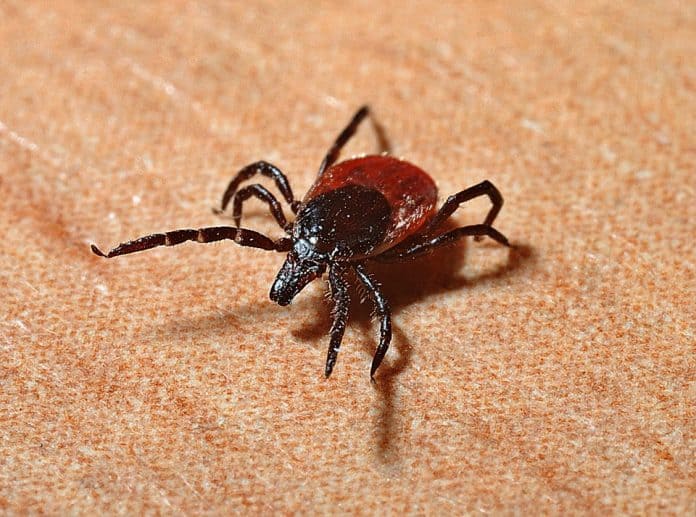
MANCHESTER – You won’t be fashionable, but dressing right is an important step to prevent tick-borne diseases.
After proclaiming June as “Tick Awareness Month,” Mayor Kenneth Palmer invited Marion Goldberg from Master Gardeners of Ocean County to speak about the pests at a recent Township Council meeting.
Many audience members were scratching themselves when Goldberg was done with her presentation.
As a master gardener, Goldberg is trained to count ticks and observe them under microscopes. Her reports go the county freeholders to keep them abreast of tick populations and associated diseases.
“Over the years, every year, the number of ticks has risen,” Goldberg said. “This is mostly due to the fact that animals are being driven out of their environment and into our environment.”

It’s up to individuals to stay out of the ticks’ ways, she added.
“You are going into their environment. It’s their home that you are stepping into. Therefore, you have to be aware that ticks are in mostly all tall grasses, uncut grass, tall weeds, and in dead leaf litter,” Goldberg said.
Ticks hang onto blades of grass and don’t care about bicycles or strollers or cars. They are waiting for that signature scent that means mealtime: carbon dioxide. And you can’t hold your breath running through the fields; your body, your pet’s body, gives off CO2 as long as you live.
Ticks typically work from the bottom up. The lazy ones will latch onto a toe or ankle. The blood-thirsty connoisseurs will find dark, moist spots further north: under the arms, in or around the ears, inside belly buttons, on the back of the knee, in and around hair, between the legs, around the waist or on the scalp.
If you’re out walking, you should stay in the center of marked trails. If you can’t avoid grassy areas, you should wear long, light pants with the legs tucked into white socks. Light-colored shirts should be tucked into pants. EPA-approved repellants with DEET can be used on skin or permethrin for clothes, boots and camping gear. Walkers should shower once they get home, to help find any attached ticks and wash away those that haven’t bitten yet. Ticks should be checked for—from the soles of your feet to the top of your head, and everywhere in between – thoroughly.
Ticks found and removed before or soon after they latch on usually haven’t had a chance to transmit any diseases to its unwilling host. Still, the New Jersey Department of Health recommends that ticks, if attached, be removed with tweezers as close to the skin as possible. Don’t twist or jerk the tick but pull straight up. Once the tick is removed, the skin should be cleaned with soap and water. A person only need call their physician if they present symptoms of a tick-borne disease.
Those infected with an illness may experience skin rashes, fatigue, fever and chills, headaches, stiff necks, muscle aches, joint pain and dizziness. Again, these are the signs and symptoms of so many diseases. It’s best to check with a physician if you’ve been bitten recently.

Most illnesses can take three days (Lyme disease, a bacteria) to up to 63 days (Babesiosis, a parasite) to show symptoms. Most illnesses can be treated effectively with antibiotics if caught early.
Three tick species call New Jersey home, and a fourth invasive species that hasn’t been found in Ocean County…yet. The black-legged “deer” tick, the American dog tick, and Lone Star tick all carry diseases that are transmittable to humans and pets. The deer tick carries Lyme disease; the dog tick, Rocky Mountain spotted fever; the Lone Star tick, Ehrlichiosis, which as with so many diseases, presents flu-like symptoms.
That’s also the infection that’s made the rounds, possibly causing those infected to become “allergic” to meat and dairy.
“Which means it forces you to become a vegetarian,” Goldberg said. But any joking aside, she said she wants residents to stay safe.
According for the Centers for Disease Control and Prevention, there were 3,332 confirmed cases of Lyme disease in 2016. Only Pennsylvania had more confirmed cases, with 8,988. There were a total of 26,203 cases in the U.S.
The master gardeners through the Rutgers Cooperative Extension offer free tick testing five days a week year-round. It’s best to bring the live tick in a baggie or other sealed container. To contact them, call 732-349-1246. The extension is located at 1623 Whitesville Road in Toms River.






